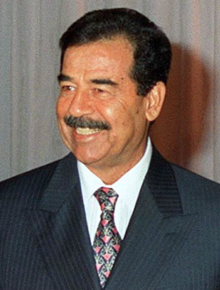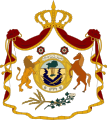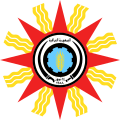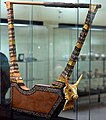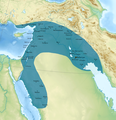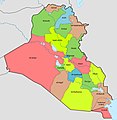
Back بوابة:العراق Arabic প্রবেশদ্বার:ইরাক Bengali/Bangla دەروازە:عێراق CKB Portal:Irak Spanish Portail:Irak French Portal:Iraq Malay Portal:Iraque Portuguese Портал:Ирак Russian Portal:Irak Turkish باب:عراق Urdu
The Iraq PortalA view of Baghdad, Iraq
Iraq, officially the Republic of Iraq, is a country in West Asia and in the geopolitical region known as the Middle East. With a population of over 46 million, it is the 31st-most populous country. It is a federal parliamentary republic that consists of 18 governorates. Iraq is bordered by Turkey to the north, Iran to the east, the Persian Gulf and Kuwait to the southeast, Saudi Arabia to the south, Jordan to the southwest, and Syria to the west. The capital and largest city is Baghdad. Iraqi people are diverse; mostly Arabs, as well as Kurds, Turkmen, Assyrians, Armenians, Yazidis, Mandaeans, Persians and Shabakis with similarly diverse geography and wildlife. Most Iraqis are Muslims – minority faiths include Christianity, Yazidism, Mandaeism, Yarsanism and Zoroastrianism. The official languages of Iraq are Arabic and Kurdish; others also recognized in specific regions are Turkish, Suret, and Armenian. Modern Iraq dates to 1920, when a Mandate was created by League of Nations. A British-backed monarchy was founded in 1921 under Faisal. The Hashemite kingdom got independence from the UK in 1932. In 1958, the kingdom was overthrown and a republic was established. Iraq was ruled by the Ba'ath Party from 1968 to 2003, led by Al-Bakr and then by Saddam Hussein, as a one-party state. Iraq engaged in war with Iran from 1980 to 1988 and another war from 1990 to 1991, resulting from the invasion of Kuwait. An invasion launched by a US-led coalition as part of its "War on Terror" in 2003, sparking a war, resulted in the defeat of Ba'athists and Saddam's execution and continued with an insurgency and secratarian civil war. U.S. troops began withdrawing in 2008 and war officially ended in 2011. The subsequent continuing repression and sectarian policies of Nouri al-Maliki's government caused protests, after which a coalition of Ba'athist and Sunni militias took up arms during a campaign. The climax of the campaign was the offensive by the ISID that marked its rapid territorial expansion, prompting the return of American troops to fight the war, which lasted until 2017. Iran has also intervened since 2014, expanding its influence through sectarian parties and Khomeinist militia groups, triggering widespread protests. (Full article...) Selected article -
Sumer (/ˈsuːmər/) is the earliest known civilization, located in the historical region of southern Mesopotamia (now south-central Iraq), emerging during the Chalcolithic and early Bronze Ages between the sixth and fifth millennium BC. Like nearby Elam, it is one of the cradles of civilization, along with Egypt, the Indus Valley, the Erligang culture of the Yellow River valley, Caral-Supe, and Mesoamerica. Living along the valleys of the Tigris and Euphrates rivers, Sumerian farmers grew an abundance of grain and other crops, a surplus which enabled them to form urban settlements. The world's earliest known texts come from the Sumerian cities of Uruk and Jemdet Nasr, and date to between c. 3350 – c. 2500 BC, following a period of proto-writing c. 4000 – c. 2500 BC. (Full article...)
Selected pictureDid you know...
Selected biography -Saddam Hussein Abd al-Majid al-Tikriti (28 April 1937 – 30 December 2006) was an Iraqi politician and revolutionary who served as the fifth president of Iraq from 1979 to 2003. He also served as prime minister of Iraq from 1979 to 1991 and later from 1994 to 2003. He was a leading member of the revolutionary Arab Socialist Ba'ath Party and later the Baghdad-based Ba'ath Party and its regional organization, the Iraqi Ba'ath Party, which espoused Ba'athism, a mix of Arab nationalism and Arab socialism. His rule was marked by numerous human rights abuses including an estimated of 250,000 arbitrary deaths and disappearances. Saddam was convicted for crimes against humanity, specifically for the Dujail Massacre and was sentenced to death by hanging. Saddam was born in the village of Al-Awja, near Tikrit in northern Iraq, to a peasant Sunni Arab family. He joined the Ba'ath Party in 1957, and later in 1966 the Iraqi and Baghdad-based Ba'ath parties. He played a key role in the 17 July Revolution and was appointed vice president of Iraq by Ahmed Hassan al-Bakr. During his time as vice president, Saddam nationalised the Iraq Petroleum Company, diversifying the Iraqi economy. He presided over the Second Iraqi–Kurdish War (1974–1975). Following al-Bakr's resignation in 1979, Saddam formally took power, although he had already been the de facto head of Iraq for several years. Positions of power in the country were mostly filled with Sunni Arabs, a minority that made up about a fifth of the population. (Full article...)
General imagesThe following are images from various Iraq-related articles on Wikipedia.
ListsTopicsCategoriesRelated portalsReligions in Iraq Arab states WikiProjectsThings you can do
Associated WikimediaThe following Wikimedia Foundation sister projects provide more on this subject:
Discover Wikipedia using portals | ||||||||
© MMXXIII Rich X Search. We shall prevail. All rights reserved. Rich X Search





